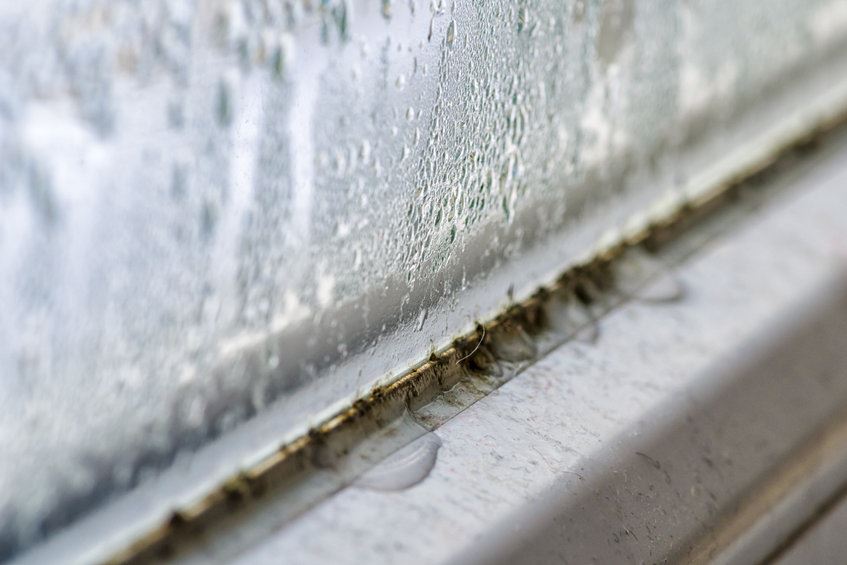When the temperatures are this hot – as we’re seeing in Chicagoland this summer – you may detect some unwelcome atmospheric changes around your home. Perhaps your home’s air smells musty or your windows are getting foggy. Or sometimes it’s just that your house feels moist. Overall, it’s not pleasant.
If any of these symptoms sound familiar, you may have an issue with humidity because your air conditioner is not controlling the level of moisture in your home’s air. Not only will it make you hot and uncomfortable, but also high interior humidity can lead to more serious problems like mold, mildew and rust, along with posing potential health risks that we’ve covered in past articles.

In Chicago, our summers are hot and humid and homeowners often call us about overly humid situations every year when the weather starts to warm up and comes to a boil around late June to early September. Well, it doesn’t have to be like that! Here’s what you all that you need to know about interior air comfort, why houses can become humid and most importantly, what you can do about it.
To get to the heart of the matter, let’s look at the phrase: “It’s not the heat, it’s the humidity.”
But in the context of HVAC, let’s talk about why it’s so important to understand what this is and why you’re experiencing it in your home – and what you can do to get rid of it!
In basic terms, humidity is the measurement of water vapor in the air. When the air holds on to more water vapor, the atmosphere will feel more wet. When the air retains less water, the environment will feel dry. That’s why you hear so many people in the Southwest of the country talk about a dry heat not being as bad. It may be hotter, but the humidity we have here in Chicagoland makes it feel worse.
Generally, people feel most comfortable at a low to medium amount of humidity. Too-low humidity may be uncomfortable and detrimental to your home and house as things get super dry. Too much humidity, on the other hand, is also not what most people would consider ideal, and can cause both health and structural complications. Ranking humidity on a scale of 1 to 100 with 100 being the highest level of humidity possible without rain, most people generally want their home to be somewhere between 45 and 55% humidity.
So that leads us to the question: Why Is My House So Humid?
Bottom line, high humidity in a dwelling happens when moisture comes inside and can’t escape. The main way that your home’s humidity level is controlled is through your air conditioning system. That’s where we come in!
Besides your AC not properly removing humidity from the air circulating inside your home, here are three of the most common ways excess moisture gets into your house and causes humidity:
Normal activities when it’s humid outside. Everyday actions like cooking, washing the dishes, running the washing machine, taking a shower, sweating and even breathing can cause moisture to build in your home and during humid weather, it becomes very obvious that extra wetness has nowhere else to go.
Leaks. Moisture could also be entering your house through leaks and cracks in or around your home.
Rising damp. This occurs when moisture from the ground rises through the pores in the bricks and masonry. Watch out for symptoms of rising damp, such as mold, rotting window frames, flaky plaster or damp or wet patches on your walls.
However, back to AC, if you’re running it as you normally do but you still feel humid, hot, and clammy while it’s on at full blast, there could be a problem with your unit. Common causes of high humidity in a house with air conditioning include an oversized unit. Contrary to what you might have been told, an air conditioning system is less effective at controlling temperature and humidity if it is too big.
This is mostly due to the power of the compressor, which allows it to run for short periods of time—too short to get rid of all the humidity from the air. Or it could be frozen coils. Your AC coils won’t be able to perform their job effectively if they’re covered in frost. As a result, your air conditioner won’t cool or dehumidify the air as well as it should.
Debris is also a problem! Dirt and dust can absolutely cause your AC to be weak when it comes to guarding against humidity. Even if you regularly replace the air filter of your AC unit, this gunk will still collect in the system over time and make it less functional.
This is a great time to mention our Comfort Club. With this membership, we can help you get in front of these problems by checking your HVAC system on a regular basis! We understand that all these issues are connected and know how to make sure you can relax for the rest of the summer and get a head start on your comfort next summer!
Check out our Whole-House Dehumidifier Guide here!
Contact us at (847) 503-9497 today to fix your humidity problems tomorrow! Enjoy the rest of your Chicagoland summer in comfort!

